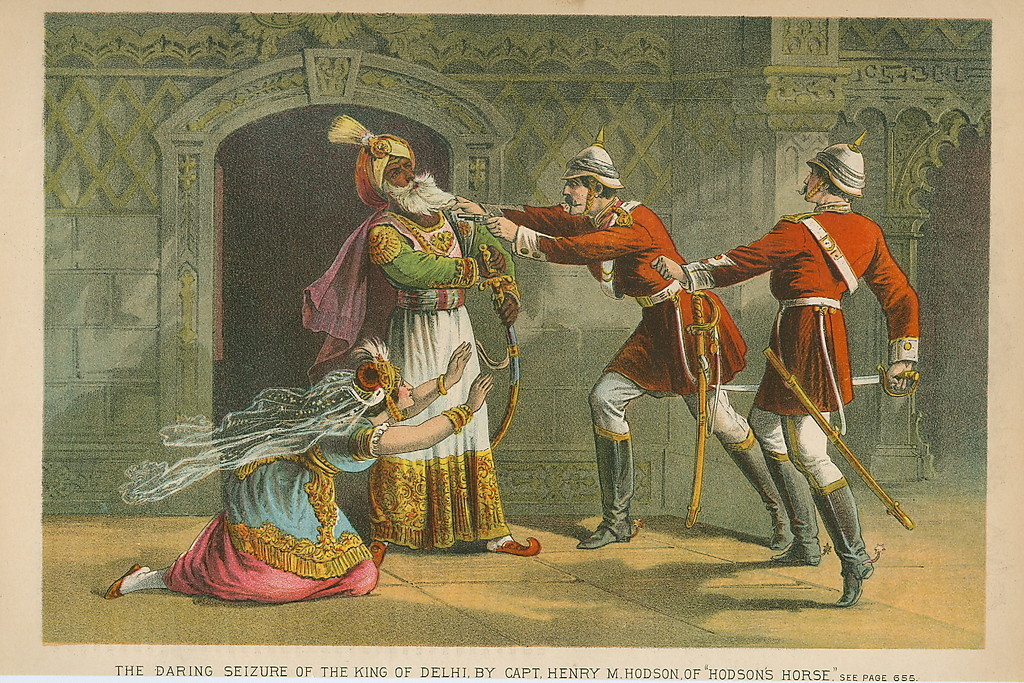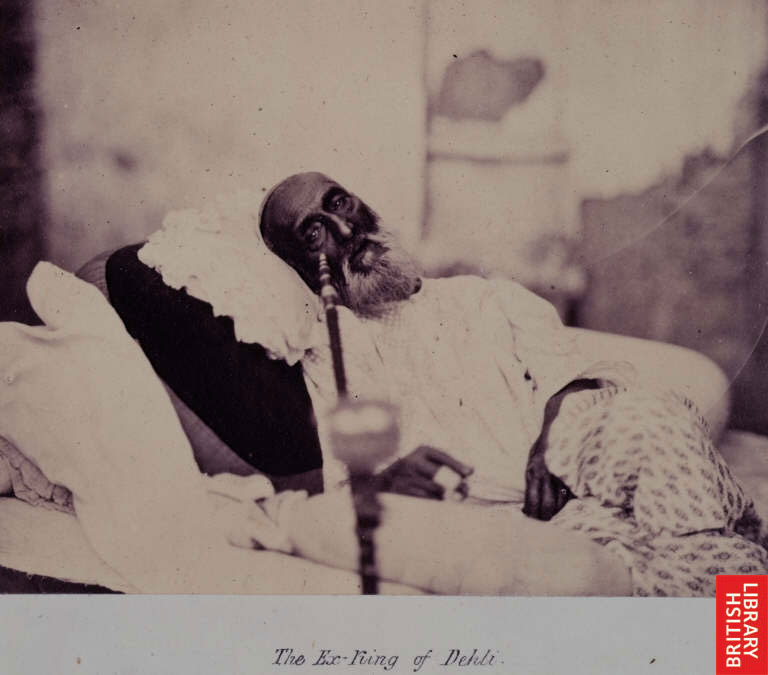"Capture of the King of Delhi by Captain Hodson," a steel engraving by the London Printing and Publishing Co., Ltd., from the 1860's; CLICK ON THE IMAGE FOR A VERY LARGE SCAN
Source: Bought on ebay and scanned by FWP, Sept. 2008

Source: http://www.harappa.com/engr/humayun.html
(downloaded Mar. 2002)
from The Illustrated London News, March 20, 1858:
HUMAYOUN'S TOMB, DELHI
"The following interesting particulars respecting the capture of the King of Delhi [Bahadur Shah Zafar], at Humayoun's Tomb, by Captain Hodson, are extracted from a letter which recently appeared in the columns of the leading journal [the London Times]. It is written by one intimately acquainted with all his proceedings during the siege, who had the account at the time from himself and other eye-witnesses:-
"I have before explained to you what our brother's (Capt. Hodson's) position officially was - viz., that he was appointed Assistant Quarter-master General and Intelligence Officer in the Commander-in-Chief's own Staff. His reports were to be made to him direct, without the intervention of the Quartermaster-General, or any other person.
"For this appointment, which was then a most responsible one, as intelligence of the enemy's movements and intentions were of the utmost importance, his long acquaintance with Sikhs and Afghans, and his having been similarly employed in the Punjab war, had peculiarly fitted him. Of course, there were always plenty of traitors in the enemy's camp ready to sell their own fathers for gain, or to avoid punishment, and he was invested with full power to promise reward or punishment, in proportion to the deserts of those who assisted him.
"On our taking posession of the city gate reports came in that thousands of the enemy were evacuating the city by other gates, and that the King, also, had left his palace. We fought our way inch by inch to the palace walls, and then found truly enough that its vast arena was void. The very day after we took posession of the palace (the 20th) Captain Hodson received information that the King and his family had gone with a large force out of the Ajmere-gate to the Kootub. He immediately reported this to the general commanding, and asked whether he did not intend to send a detachment in pursuit, as with the King at liberty and heading so large a force our victory was next to useless, and we might be besieged instead of being besiegers. General Wilson replied that he could not spare a single European. He then volunteered to lead a party of the Irregulars; but this offer was also refused, though backed by Neville Chamberlain.
"During this time messengers were coming in constantly, and among the rest one from Zeenat Mahal (the favourite Begum), with her offer to use her influence with the King to surrender on certain conditions. These conditions were at first ludicrous enough - viz., that the King and the whole of the males of his family should be restored to this palace and honours; that not only should his pension be continued, but the arrears since May be paid up, with several other equally modest demands. I need not say that these were treated with contemptuous denial. Negotiations, however, were vigorously carried on, and care was taken to spread reports of advance in force to the Kootub. Every report as it came in was taken to General Wilson, who at last gave orders to Captain Hodson to promise the King's life and freedom from personal indignity, and make what other terms he could. Captain Hodson then started with only fifty of his own men for Humayoun's Tomb, three miles from the Kootub, where the King had come during the day. The risk was such as no one can judge of who has not seen the road, amid the old ruins scattered about of what was once the real city of Delhi.
"He concealed himself and men in some old buildings close by the gateway of the Tomb, and sent in his two emissaries to Zeenat Mahal with the ultimatum - the King's life and that of her son and father (the latter has since died). After two hours passed by Captain Hodson in most trying suspense, such as (he says) he never spent before, while waiting the decision, his emissaries (one an old favourite of poor Sir Henry Lawrence) came out with the last offer - that the King would deliver himself to Captain Hodson only, and on condition that he repeated with his own lips the promise of the Government for his safety.
"Captain Hodson then went out into the middle of the road in front of the gateway, and said that the was ready to receive his captives and renew his promise.
"You may picture yourself the scene before the magnificent gateway, with the milk-white domes of the tomb towering up from within, one white man among a host of natives, yet determined to secure his prisoner or perish in the attempt.
"Soon a procession began to come slowly out, first Zeenat Mahal, on one of the close native conveyances used for women. Her name was announced as she passed by the Moulvie. Then came the King in a palkee, on which Capt. Hodson rode forwarded and demanded his arms. Before giving them up, the King in asked whether he was 'Hodson Bahadoor,' and if he would repeat the promse made by the herald? Captain Hodson answered that he would, and repeated that the Government had been graciously pleased to promise him his life, and that of Zeenat Mahal's son, on condition of his yielding himself prisoner quietly, adding very emphatically, that if any attempt was made at a rescue he would shoot the King on the spot like a dog.
"The old man then gave up his arms, which Capt. Hodson handed to his orderly, still keeping his own sword drawn in his hand. The same ceremony was then gone through with the boy (Jumma Bukh), and the march towards the city began, the longest five miles, as Captain Hodson said, that he ever rode, for, of course, the palkees only went at foot pace, with his handful of men around them, followed by thousands, any one of whom could have shot him down in a moment.
"His orderly told me that it was wonderful to see the influence which his calm and undaunted look had on the crowd. They seemed perfectly paralyzed at the fact of one white man (for they thought nothing of his 50 black sowars) carrying off their King alone. Gradually as they approached the city the crowd slunk away, and very few followed up to the Lahore-gate. Then Captain H. rode on a few paces and ordered the gate to be opened. The officer on duty asked simply as he passed what he had got in his palkees. 'Only the King of Delhi' was the answer; on which the officer's enthusiastic exclamation was more emphatic than becomes ears polite. The guard were for turning out to greet him with a cheer, and could only be repressed on being told that the King would take the honour to himself. They passed up that magnificent deserted street to the palace gate, where Captain Hodson met the civil officer (Mr. Sanders), and formally delivered over his royal prisoners to him. His remark was amusing 'By Jove, Hodson, they ought to make you commander-in-chief for this.'
"On proceeding to the General's quarters to report his successful return, and hand over the Royal arms, he was received with characteristic speech,"Well, I am glad that you have got him, but I never expected to see either him or you again!" while the other officers in the room were loud in their congratualtions and applause. He was requested to select for himself from the royal arms what he chose, and has therefore two magnificent swords, one with the name of 'Nadir Shah,' and the other the seal of Jehan Guire [Mughal Emperor Jehanghir] engraved upon it, which he intends to present to the Queen.
"On the following day, as you already know, he captured three of the Princes; but of this more hereafter. I am anxious now that you should fully understand that your brother was bound by orders from the General to spare the King's life, much against his own will; that the capture alone was on his own risk and responsibility, and not the pledge.
"Mr. George H. Hodson (the brother of Captain Hodson), who sends the above letter to the Times, says: - "I have also letters flatly contradicting the report which has circulated, that the King was allowed to retain his retinue and his own apartments in the Palace, and giving an account of a visit to him in his place of confinement. I will endeavor to send you this on another occasion."

== Indian Routes index == Indian Routes sitemap == Glossary == FWP's main page ==